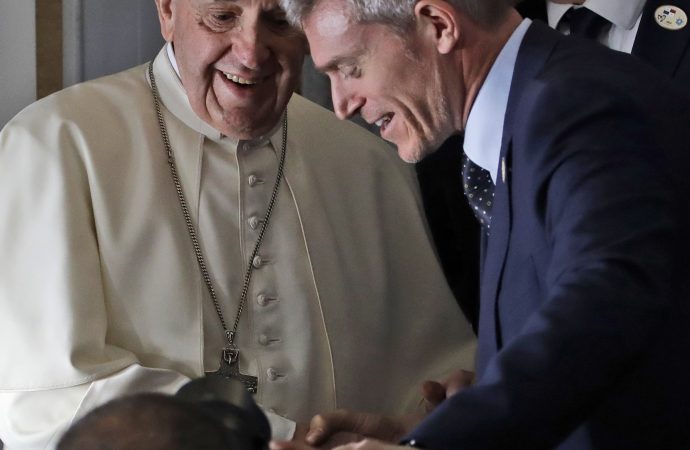As a Pope Picks a Spokesman, Could History Repeat Itself?
By John L. Allen Jr
When the Vatican announced Thursday that Pope Francis had named a new spokesman, most early reaction suggested the move didn’t exactly inspire confidence about an upgrade in the role of the press office. The pope tapped a 43-year-old Italian layman who’s worked in the press office for the last decade, and who’s known primarily for his organizational chops, his charm, and his command of languages (including a flawless British-accented English.) While those are all good qualities, it struck most observers as an option for a competent functionary rather than a genuine power broker. Yet just to play devil’s advocate, I’d like to offer a brief refresher in the recent history of Vatican communications. Thirty-five years ago, a pope from a foreign land had been in office for about six years when he hired a new lay spokesman who hailed from that pontiff’s favorite “new movement” in the Church. The rest, as they say, is history, as Spanish layman Joaquin Navarro Valls went on to shape the global narrative about St. John Paul II masterfully for more than twenty years. At least in terms of a few basic matters of biography, there’s a case that history may be repeating itself in Matteo Bruni. Bruni replaces another Italian layman, Alessandro Gisotti, who’d held the post of papal spokesman on an interim basis since veteran American journalist Greg Burke stepped down last December. Burke, as it happens, is a member of Opus Dei, just like Navarro-Valls. His affiliation was a huge asset for Navarro, as John Paul II was a big fan of the group founded by St. Josemaria Escriva in Spain in 1928. The Polish pope, who came of age behind the Iron Curtain and was confronted with its indoctrination about labor and class struggle, admired the alternative spirituality of work fostered by Opus Dei. He displayed his gratitude in a big way at least once a decade, declaring Opus Dei a personal prelature in 1982, beatifying Escriva in 1992 and canonizing him in 2002. In part because of his Opus Dei background, in part because of his profile as an accomplished journalist who’d served as president of Rome’s Foreign Press Club, and in part because of his strong personality and unwavering devotion, John Paul trusted Navarro and gave him virtually unfettered access - which, of course, is the coin of the realm when it comes to any leader’s mouthpiece. Because the pope had his back, Navarro was able to exercise real leadership in the rarified world of the Vatican and he was also taken seriously by journalists covering the place. He often could set narratives in motion or stop them in their tracks, in part by doling out insider information or bestowing access to key figures (both of which he had in abundance). Whether Bruni will be able to wield the same influence is a long shot, in part because it’s not at all clear Pope Francis takes corporate communications or the role of his spokesman especially seriously. From the beginning, Francis has acted as his own spokesman, using unofficial channels and speaking in an unscripted manner without consulting his official communications experts. His three spokesmen so far - Father Federico Lombardi, Burke and Gisotti - often were as surprised as anyone else by the latest papal bombshell. Yet by now, Francis appears to have become a bit more disciplined in engaging the media. His airborne news conferences at the end of overseas trips haven’t delivered any “Who am I to judge?” frenzies for a while, and he appears more willing to allow his spokesman to set a tone and steer the discussion. If Francis is looking for more bang for his buck out of the spokesman’s role, Bruni in many ways seems well-cast for the part. For one thing, he’s a member of the Community of Sant’Egidio, which is more or less to Francis what Opus Dei was to John Paul. Francis admires Sant’Egidio’s efforts in defense of the poor and immigrants, its accomplishments in conflict resolution, and its commitment to ecumenical and interfaith dialogue. Bruni referred to that background in an interview Thursday with Vatican News, saying he’s been shaped by his experience of the “poor of the peripheries of Rome and the world, which I lived with the Community of Sant’Egidio since I was a high school student.” It obviously boosts the stock of any spokesperson when the boss believes you move in the right circles. It also helps that Bruni’s previous gig included handling the logistics of foreign trips for the press corps that travels aboard the papal plane. It’s a thankless, pain-in-the-neck gig, but Bruni is generally well-liked by reporters for his preternatural calm and helpful disposition. Of course, the media landscape has changed significantly since Navarro’s time. In his day, if you could influence the thinking of a handful of journalists from major outlets, you essentially owned the story; in a social media and blog-driven world, it’s a whole different ball game, and it’s not clear any spokesperson could have the same impact. Time will tell, but at least one can say that Bruni seems as well-positioned as anybody to inspire this pope’s confidence.
|
.
Any original material on these pages is copyright © BishopAccountability.org 2004. Reproduce freely with attribution.
